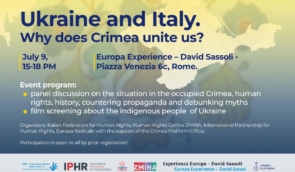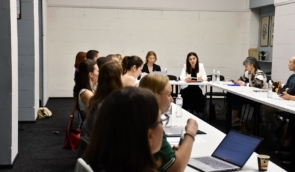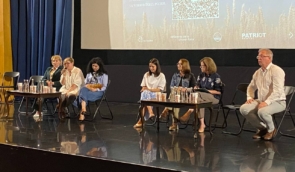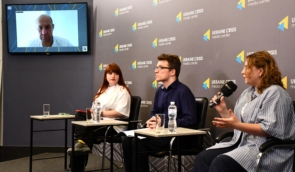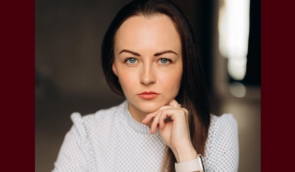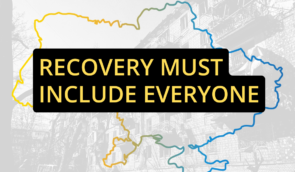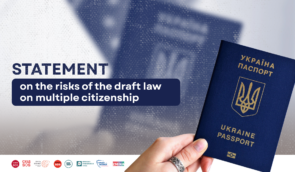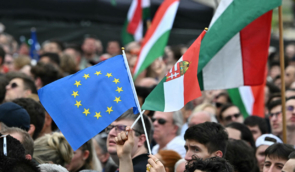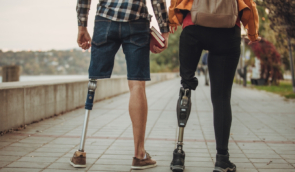Human rights defenders are outraged by the position of the Ministry of Justice regarding civil partnerships
To Minister of Justice of Ukraine
Denis Malyuska
OPEN LETTER
Dear Minister!
We, the undersigned representatives and allies of the Ukrainian LGBTIQ+ community, received your response to electronic petition No. 22/185864-еп “On registered partnerships for same-sex and heterosexual couples” submitted by Petro Zherukha and supported by more than 25 000 citizens of Ukraine.
Thus, in the response of 13.06.2023, it was stated that the Ministry continues to work on “the introduction of the civil partnership institution… taking into account the differences from existing… institutions and in no way interfering with… family values inherent in Ukrainian society.”
The Ministry’s response is quite surprising, as the talking points that contrast the fight for equality of LGBTIQ+ people and the “protection” of family values is one of the biggest manipulations aimed at dividing Ukrainian society. In addition, it repeats the claim of allegedly “protecting traditional family values”, which Russian propaganda uses as one of the absurd “grounds” for waging an aggressive war against Ukraine.
Unfortunately, the process of developing the draft law on civil partnerships by the Ministry of Justice has not been sufficiently transparent so far, the LGBTIQ+ community and its allies have not been involved in all stages of its development, despite their willingness to provide suggestions and professional expert opinion.
Taking into consideration all the above, we ask you to:
- Confirm or deny that, according to the draft law on civil partnerships being developed by the Ministry of Justice, civil partners will not acquire the status of a family.
- Provide the text of the draft law for review and hold consultations with LGBTIQ+ organizations and other stakeholders whose interests it really affects.
- Consider the following suggestions for the draft law:
І. First of all, we want to emphasize that the draft law should provide for the granting of family status to partners.
Previously, on 07.04.2023, at a meeting of the Verkhovna Rada Committee on Youth and Sports, a representative of the Ministry of Justice said: “According to the Family Code, a family is created on the basis of marriage. We know what marriage is based on the Constitution of Ukraine, which cannot be changed during martial law. Therefore, we are actually moving away from this concept, and the subjects of our legislative initiative, as we are currently planning, are actually people who do not necessarily have to be one family. Because we are talking about people who, for example, are single and help each other, perhaps even live together, but are not a family, or, for example, people who are fighting together and want to enter into, so to speak, a brotherhood and sisterhood agreement”.
Given such a stance of the Ministry, we believe it is necessary to emphasize the following.
Pursuant to Article 3 of the Family Code of Ukraine, a family is composed of persons that live together, have joint household, mutual rights and responsibilities. The law provides for cases when such persons may not live together. It also says that a family is created on the basis of marriage, blood kinship, adoption, as well as on other grounds not prohibited by law and not contrary to the moral foundations of society.
Marriage, that is, a family union of a woman and a man registered with a civil registry office is only one of the grounds for creating a family. While partnership is another form, not prohibited by law (but not regulated by law today). Relevant provisions should be included in the draft law being prepared by the Ministry.
Ukrainian courts have repeatedly recognized the family nature of the actual cohabitation of two persons of the same sex, in particular in inheritance cases. Thus, in our opinion, the draft law proposed by the Ministry of Justice may worsen rather than improve the situation of LGBTIQ+ people and families in Ukraine if it does not recognize partners as family.
Non-recognition of partners as family entails risks, the main ones being:
- Without being recognized as a family, partners will not have access to a number of rights that are inherently granted only to families.
Due to the lack of official recognition of partners as a family, they will face problems both at the legal and domestic levels.
At the legal level, there are a number of rights and obligations that are exclusive to family and relatives and are granted by virtue of being a member of such a family. This includes, for example, the right of family members to use residential premises, the right to family reunification, the obligation to declare family members’ property, the possibility to inherit with zero tax, the possibility to receive an inheritance in the absence of a will, the right not to testify in court, etc.
The fact that the draft law specifies, contrary to the logic of the law and the rules of legal practice, that these rights and obligations apply not only to family members, but also to partners individually, will lead to practical difficulties and uncertainty in various situations, especially in those where it will be necessary to determine the priority between partners and other relatives (rights related to decision-making, inheritance, etc.).
Moreover, in this case, it will be impossible to grant a number of rights to partners even in this case. This applies to the right to family reunification, as this category goes beyond the scope of Ukrainian law. Therefore, not recognizing partners as a family simply makes it impossible to grant them this right. This also applies to the right not to testify in court, as this would require amendments to the Constitution (which reserves this right for close relatives), which is impossible in the current situation, given the legal regime of martial law.
- Granting certain rights without recognizing partners as a family cannot be seen as a sufficient and proper fulfillment of our positive obligations as a state under Article 8 of the European Convention on Human Rights.
Providing equal opportunities to people, regardless of their orientation, is not an option, but an obligation for Ukraine as a state party to the European Convention on Human Rights.
On June 1, 2023, the European Court of Human Rights issued a decision in the case of “Maimulakhin and Markiv v. Ukraine”, in which it recognized that Ukraine violated Article 14 in conjunction with Article 8 of the Convention.
In the response to the petition, the decision of the ECHR in the case of “Maimulakhin and Markiv v. Ukraine” was mentioned, but the response doesn’t contain a reference to the substance of Article 8 of the ECHR. After all, it guarantees the right to respect private and family life. Whereas from your answer it generally follows that according to the draft law that is being developed by the Ministry of Justice, civil partnership will obviously not be given the status of a family.
In its decisions on violations of Article 8 of the Convention in this category of cases, the ECHR emphasizes that this applies to both components of the Article: the right to private and family life.
In terms of family life, the ECHR emphasizes that in the sense of the Convention, it is determined by the existence of close personal ties between people. These ties are not even determined by the fact of living together, as in the modern world, close relationships can be maintained at a distance. The ECHR emphasizes that the only criterion that should define family relationships is the stability and mutual commitment of people in the relationship (“stable and committed relationships”).
In addition, the ECHR explains that the state has a positive obligation to ensure the right to respect for private and family life under Article 8 of the Convention, in particular by introducing national legislation allowing same-sex couples to have their relationships recognized and protected. Granting certain rights (for example, those related to property or inheritance relations) does not include the aspect of recognition, which is an integral part of the state’s positive obligation under Article 8 of the Convention. The Court also emphasizes that the recognition and protection of a couple are inextricably linked. The absence of official recognition, which makes couple use other mechanisms, such as going to court, to somehow protect their basic needs as a couple, is in itself an obstacle to respect for their private and family life.
Therefore, granting certain rights to partners without recognizing family status will not be considered a fulfillment of the obligation on the part of Ukraine, and the relevant provisions of the European Convention on Human Rights will still be considered violated.
Considering the wording of “taking into account the opinion of society” and “maximum observance of the balance of interests” in the response to the petition, we believe it necessary to also pay attention to the following stance of the European Court of Human Rights from the relevant practice:
“it would be incompatible with the underlying values of the Convention if the exercise…of rights by minority group were made conditional on its being accepted by the majority…Were this so, a minority group’s rights … would become merely theoretical rather than practical and effective as required by the Convention”.
It is unclear what is meant by “balance of interests” and who is the other party in the search for such a balance. We know that religious organizations in Ukraine are demanding that the rights of LGBTIQ+ people be restricted. However, according to the Constitution of Ukraine, the church and religious organizations in Ukraine are separated from the state (Article 35). The human being, his or her life and health, honor and dignity, inviolability and security are recognised in Ukraine as the highest social value. At the same time to affirm and ensure human rights and freedoms is the main duty of the State (Article 3).
In our opinion, the recognition of the right of LGBTIQ+ people to respect for their family life in no way restricts the rights and interests of any other groups in Ukrainian society. If introduced, the institution of civil partnership as a form of family union will be voluntary, not mandatory, and will not impose any restrictions on the rights and freedoms of those who do not wish to enter into such partnerships for religious or other reasons.
ІІ. In addition to granting family status, the draft law should provide for a number of provisions that are key to proper and necessary legal protection. These include:
- the right to officially identify the body, study the causes of death, familiarize with medical records, dispose of the body, receive the body from the morgue, determine the burial or cremation ceremony, determine the inscription at the burial site, and the right to be buried nearby;
- the right to make medical decisions in certain cases;
- the right not to testify in court;
- the right to jointly own property with the possibility for the partners to choose another option;
- regulation of provisions for inheritance by law and by will including provisions for inheritance at a 0% tax rate;
- regulation of gift provisions including the possibility of gifting at a 0% tax rate;
- the right to receive pensions and financial assistance in certain cases and other social guarantees;
- the right to take leave for family reasons in case of a partner’s death, as well as to register a partnership;
- the right to authorize the use of the partner’s name and personal papers, the right to refute false information about the deceased partner, etc;
- the right to receive information when a partner is in captivity or missing.
We believe that these rights are fundamental for partners to be sufficiently protected from a legal point of view, and therefore the relevant provisions should be included in the draft law being developed by the Ministry.
We urge you to take into account the position of the representatives and allies of LGBTIQ+ people who have signed this letter when drafting the law.
We hope that by working together we will be able to achieve progress, as adoption of this draft law by Ukraine is an important criterion in terms of our integration into the European political and legal space and fulfillment of our obligations as a state party to the European Convention on Human Rights.
List of applying organizations and individuals:
- NGO “Ukrainian LGBT+ military for equal rights”
- NGO “Fulcrum UA”
- NGO “Gender Stream”
- NGO “Women in Media”
- Charitable foundation “Gender Zed”
- NGO “You are not alone”
- NGO “Insight”
- Human Rights Center ZMINA
- NGO “Educational Center for Human Rights in Lviv”
- NGO “Expert resource Gender in detail”
- Charitable organization “Insha”
- NGO “Information and Educational Center “For Equal Rights”
- NGO “Steve Jobs Center for Information Technology Assistance”
- HGO “Trans*Generation”
- Kyiv Independent Student Trade Union “Direct Action”
- The European region of the International Lesbian, Gay, Bisexual, Trans and Intersex Association – ILGA-Europe
If you have found a spelling error, please, notify us by selecting that text and pressing Ctrl+Enter.

